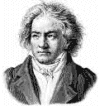
Ludwig van Beethoven
What is the world's best-known, best-loved music? In the Western world it must be the final movement of Beethoven's Ninth Symphony,
The Choral.
Its main theme has undergone countless adaptations and corruptions, gracing Olympic opening ceremonies and major television events, and yet amazingly survives integrity intact. The original form, as the conclusion to Beethoven's final symphony, is still one of the most powerful and uplifting pieces of music ever written.
It was revolutionary in its time. The symphony, that most classical and formal musical creation of the 18th century became, under Beethoven's pen, a huge expression of courage and will, almost a political statement. And for the first time, a quartet of vocalists and choir was introduced into the last movement, a form later expanded by Mahler.
Despite its fame, very few non-German speaking people know what the lyrics are about. Beethoven used Friedrich von Schiller's poem
Ode "An Die Freude" (Ode to Joy) as his inspiration.
The first verse:
Freude, schöner Götterfunken
Tochter aus Elysium,
Wir betreten feuertrunken,
Himmlische, dien Heiligtum!
Deine Zauber binden wieder,
Was die Mode streng geteilt;
Alle Menschen werden Brüder,
Wo dein sanfter Flügel weilt.
|
Joy, bright spark of divinity,
Daughter of Elysium,
Fire-inspired we tread
Thy sanctuary.
Thy magic power re-unites
All that custom has divided,
All men become brothers,
Under the sway of thy gentle wings.
|
Sure, its full of German Romantic idealism, but it was the obvious choice of music to the celebrate the fall of the Berlin wall in 1989. To mark the occassion, Justus Franz, artistic advisor to the Bavarian Radio Symphony Orchestra, invited musicians from the Soviet Union, USA, Britain and France to join with the Orchestra in a concert on both sides of the wall. East and West, victor and defeated, united in music.

Justus Franz chose Leonard Bernstein as the conductor a master musician and showman, but also a man with deep political convictions. And if there was ever a justification for poetic licence, then this must be it. Where Schiller had written
Freude (Joy), Bernstein and Franz substitute
Freiheit (Freedom), "and", wrote Bernstein "I am sure we have Beethoven's blessing".
This is perhaps not the definative version of the Beethoven Ninth Symphony. The set by Harnoncourt with the Chamber Orchestra of Europe, and also Karajan's 1963 edition spring to mind as the landmarks for this work. But there is such a sense of occasion and jubilation, a sense almost that this historic event is truly worthy of Beethoven's greatest music, that makes this recording special.
A souvenir from a great moment in history.
Please support Good-Music-Guide.com
by purchasing this CD using this link.

Track Listing
Ludwig van Beethoven
Symphony No.9 The Choral
Various orchestras
Leonard Bernstein
June Anderson, Soprano
Sarah Walker, Mezzosoprano
Klaus König, Tenor
Jan-Hendrik Rootering, Bass
Symphony Number 9 in D Minor Op.125 The Choral
- Allegro ma non troppo, un poco maestoso
- Molto vivace
- Adagio molto e cantabile
- Presto - Allegro assai